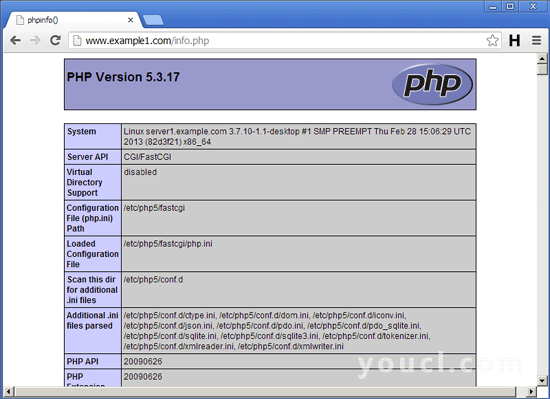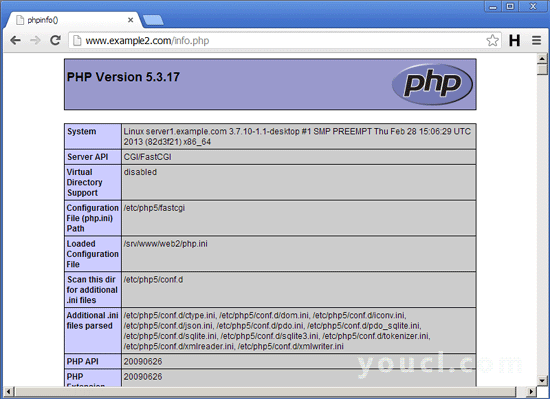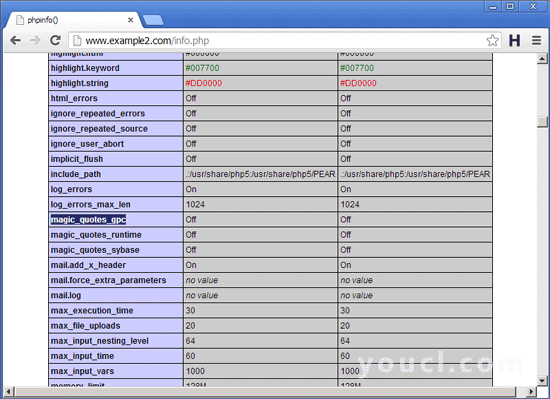本教程介绍如何在OpenSUSE 12.3上安装带有mod_fcgid和PHP5的Apache2。 mod_fcgid是旧的mod_fastcgi的兼容替代方案。 它允许您使用其所有者的权限执行PHP脚本,而不是Apache用户。
1初步说明
本教程中使用的是OpenSUSE 12.3服务器,主机名为server1.example.com ,IP地址为192.168.0.100 。
我将在本教程www.example1.com和www.example2.com中创建两个Apache vhost,以演示mod_fcgid的用法。
2安装Apache2 / mod_fcgi / PHP5
我们可以安装Apache2,mod_fcgid和PHP5,如下所示:
zypper install apache2 apache2-mod_fcgid php5-fastcgi
如果Apache2已经安装了PHP5作为Apache模块,请立即禁用PHP5模块:
a2dismod php5
下一步启用suexec和fcgid模块:
a2enmod suexec
a2enmod fcgid
然后我们创建Apache的系统启动链接并启动它:
systemctl enable apache2.service
systemctl start apache2.service
接下来我们打开/etc/php5/fastcgi/php.ini ...
vi /etc/php5/fastcgi/php.ini
...并取消注释行cgi.fix_pathinfo = 1 :
[...] ; cgi.fix_pathinfo provides *real* PATH_INFO/PATH_TRANSLATED support for CGI. PHP's ; previous behaviour was to set PATH_TRANSLATED to SCRIPT_FILENAME, and to not grok ; what PATH_INFO is. For more information on PATH_INFO, see the cgi specs. Setting ; this to 1 will cause PHP CGI to fix its paths to conform to the spec. A setting ; of zero causes PHP to behave as before. Default is 1. You should fix your scripts ; to use SCRIPT_FILENAME rather than PATH_TRANSLATED. ; http://php.net/cgi.fix-pathinfo cgi.fix_pathinfo=1 [...] |
打开/etc/apache2/conf.d/mod_fcgid.conf ...
vi /etc/apache2/conf.d/mod_fcgid.conf
...并添加行PHP_Fix_Pathinfo_Enable 1 (此行不能进入<VirtualHost>部分,因为那会得到此错误: PHP_Fix_Pathinfo_Enable不能在<VirtualHost>部分中发生 ):
[...] PHP_Fix_Pathinfo_Enable 1 </IfModule> |
然后重新启动Apache:
systemctl restart apache2.service
3为www.example1.com和www.example2.com创建Vhosts
我现在将创建两个vhosts: www.example1.com (使用文档root / srv / www / web1 / web )和www.example2.com (使用文档root / srv / www / web2 / web )。 www.example1.com将由用户和组web2由用户和组web1和www.example2.com所有。
首先我们创建用户和组:
groupadd web1
groupadd web2
useradd -s /bin/false -d /srv/www/web1 -m -g web1 web1
useradd -s /bin/false -d /srv/www/web2 -m -g web2 web2
chmod 755 /srv/www/web1
chmod 755 /srv/www/web2
然后,我们创建文档根,并使其由用户/组web1或它们拥有。 web2 :
mkdir -p /srv/www/web1/web
chown web1:web1 /srv/www/web1/web
mkdir -p /srv/www/web2/web
chown web2:web2 /srv/www/web2/web
我们将使用suExec运行PHP; suExec的文档根目录是/ srv / www ,如下所示:
/usr/sbin/suexec2 -V
server1:~ # /usr/sbin/suexec2 -V
-D AP_DOC_ROOT="/srv/www"
-D AP_GID_MIN=96
-D AP_HTTPD_USER="wwwrun"
-D AP_LOG_EXEC="/var/log/apache2/suexec.log"
-D AP_SAFE_PATH="/usr/local/bin:/usr/bin:/bin"
-D AP_UID_MIN=96
-D AP_USERDIR_SUFFIX="public_html"
server1:~ #
因此,我们不能直接调用PHP二进制文件( / usr / bin / php-cgi ),因为它位于suExec的文档根目录之外。 由于suExec不允许符号链接,解决问题的唯一方法是为/ srv / www子目录中的每个网站创建一个包装器脚本; 然后,包装器脚本将调用PHP二进制文件/ usr / bin / php-cgi 。 包装器脚本必须由每个网站的用户和组拥有,因此我们需要每个网站的一个包装器脚本。 我将在/ srv / www / php-fcgi-scripts的子目录中创建包装器脚本,例如/ srv / www / php-fcgi-scripts / web1和/ srv / www / php-fcgi-scripts / web2 。
mkdir -p /srv/www/php-fcgi-scripts/web1
mkdir -p /srv/www/php-fcgi-scripts/web2
vi /srv/www/php-fcgi-scripts/web1/php-fcgi-starter
#!/bin/sh PHPRC=/etc/php5/fastcgi/ export PHPRC export PHP_FCGI_MAX_REQUESTS=5000 export PHP_FCGI_CHILDREN=8 exec /usr/bin/php-cgi |
vi /srv/www/php-fcgi-scripts/web2/php-fcgi-starter
#!/bin/sh PHPRC=/etc/php5/fastcgi/ export PHPRC export PHP_FCGI_MAX_REQUESTS=5000 export PHP_FCGI_CHILDREN=8 exec /usr/bin/php-cgi |
PHPRC行包含php.ini文件所在的目录(即/ etc / php5 / fastcgi /转换为/etc/php5/fastcgi/php.ini )。 PHP_FCGI_MAX_REQUESTS是在fcgid进程停止并启动新请求之前的最大请求数。 PHP_FCGI_CHILDREN定义将启动的PHP子代数 。
php-fcgi-starter脚本必须是可执行的,它们(以及它们所在的目录)必须由网站的用户和组拥有:
chmod 755 /srv/www/php-fcgi-scripts/web1/php-fcgi-starter
chmod 755 /srv/www/php-fcgi-scripts/web2/php-fcgi-starter
chown -R web1:web1 /srv/www/php-fcgi-scripts/web1
chown -R web2:web2 /srv/www/php-fcgi-scripts/web2
现在我们为www.example1.com和www.example2.com创建Apache vhosts:
vi /etc/apache2/vhosts.d/www.example1.com.conf
<VirtualHost *:80>
ServerName www.example1.com
ServerAlias example1.com
ServerAdmin webmaster@example1.com
DocumentRoot /srv/www/web1/web/
<IfModule mod_fcgid.c>
SuexecUserGroup web1 web1
<Directory /srv/www/web1/web/>
Options +ExecCGI
AllowOverride All
AddHandler fcgid-script .php
FCGIWrapper /srv/www/php-fcgi-scripts/web1/php-fcgi-starter .php
Order allow,deny
Allow from all
</Directory>
</IfModule>
# ErrorLog /var/log/apache2/error.log
# CustomLog /var/log/apache2/access.log combined
ServerSignature Off
</VirtualHost> |
vi /etc/apache2/vhosts.d/www.example2.com.conf
<VirtualHost *:80>
ServerName www.example2.com
ServerAlias example2.com
ServerAdmin webmaster@example2.com
DocumentRoot /srv/www/web2/web/
<IfModule mod_fcgid.c>
SuexecUserGroup web2 web2
<Directory /srv/www/web2/web/>
Options +ExecCGI
AllowOverride All
AddHandler fcgid-script .php
FCGIWrapper /srv/www/php-fcgi-scripts/web2/php-fcgi-starter .php
Order allow,deny
Allow from all
</Directory>
</IfModule>
# ErrorLog /var/log/apache2/error.log
# CustomLog /var/log/apache2/access.log combined
ServerSignature Off
</VirtualHost> |
确保您填写正确的路径(以及SuexecUserGroup行中的正确用户和组)。
打开/etc/apache2/httpd.conf ,并在Include /etc/apache2/vhosts.d/*.conf行之前添加NameVirtualHost行(否则只有第一个vhost将工作):
vi /etc/apache2/httpd.conf
[...] ### Virtual server configuration ############################################ # # VirtualHost: If you want to maintain multiple domains/hostnames on your # machine you can setup VirtualHost containers for them. Most configurations # use only name-based virtual hosts so the server doesn't need to worry about # IP addresses. This is indicated by the asterisks in the directives below. # # Please see the documentation at # <URL:http://httpd.apache.org/docs-2.2/vhosts/> # for further details before you try to setup virtual hosts. # # You may use the command line option '-S' to verify your virtual host # configuration. # NameVirtualHost *:80 Include /etc/apache2/vhosts.d/*.conf [...] |
在重新启动Apache之前,我们更改了suExec可执行文件的权限(否则,当您重新启动Apache时,您将看到以下警告: 警告:SuexecUserGroup伪指令需要SUEXEC包装器。 ):
chmod 4755 /usr/sbin/suexec2
之后重新启动Apache:
systemctl restart apache2.service
4测试
现在我们创建一个小的PHP测试文件,例如在www.example1.com网站上...
vi /srv/www/web1/web/info.php
<?php phpinfo(); ?> |
...并在浏览器中调用该文件( http://www.example1.com/info.php )。 如果一切顺利,输出应该与此类似,您应该在Server API行中看到CGI / FastCGI :

每个网站的自定义php.ini
因为每个网站都有自己的php-fcgi-starter包装器脚本,所以可以为不同的网站定义不同的php.ini文件。 为了演示这一点,我将把默认的php.ini ( /etc/php5/fastcgi/php.ini )复制到/ srv / www / web2 /目录,并使www.example2.com从/ srv中使用php.ini / www / web2 /目录:
cp /etc/php5/fastcgi/php.ini /srv/www/web2/
chown web2:web2 /srv/www/web2/php.ini
(您现在可以将/srv/www/web2/php.ini修改为您的喜好)
然后我们打开/ srv / www / php-fcgi-scripts / web2 / php-fcgi-starter ...
vi /srv/www/php-fcgi-scripts/web2/php-fcgi-starter
...和put / srv / www / web2 /在PHPRC行中:
#!/bin/sh PHPRC=/srv/www/web2/ export PHPRC export PHP_FCGI_MAX_REQUESTS=5000 export PHP_FCGI_CHILDREN=8 exec /usr/bin/php-cgi |
之后重新启动Apache:
systemctl restart apache2.service
创建一个新的phpinfo(); 文件www.example2.com ...
vi /srv/www/web2/web/info.php
<?php phpinfo(); ?> |
...并在浏览器中调用( http://www.example2.com/info.php )。 加载配置文件行现在应显示/srv/www/web2/php.ini :

6更改单个PHP配置设置
而不是将全新的php.ini文件传递到您的网站,您还可以通过将-d开关添加到PHP来更改php-fcgi-starter包装器脚本中的单个PHP配置设置(或使用两者的组合)可执行。 例如,如果我想禁用web_example2.com的magic_quotes_gpc ,我可以这样做:
vi /srv/www/php-fcgi-scripts/web2/php-fcgi-starter
#!/bin/sh PHPRC=/etc/php5/fastcgi/ export PHPRC export PHP_FCGI_MAX_REQUESTS=5000 export PHP_FCGI_CHILDREN=8 exec /usr/bin/php-cgi -d magic_quotes_gpc=off |
之后重新启动Apache:
systemctl restart apache2.service
然后在浏览器( http://www.example2.com/info.php )中再次调用info.php脚本,并搜索magic_quotes_gpc行 - 现在应该显示:

7链接
- mod_fcgid: http : //fastcgi.coremail.cn/
- Apache: http : //httpd.apache.org/
- PHP: http : //www.php.net/
- OpenSUSE: http : //www.opensuse.org/








